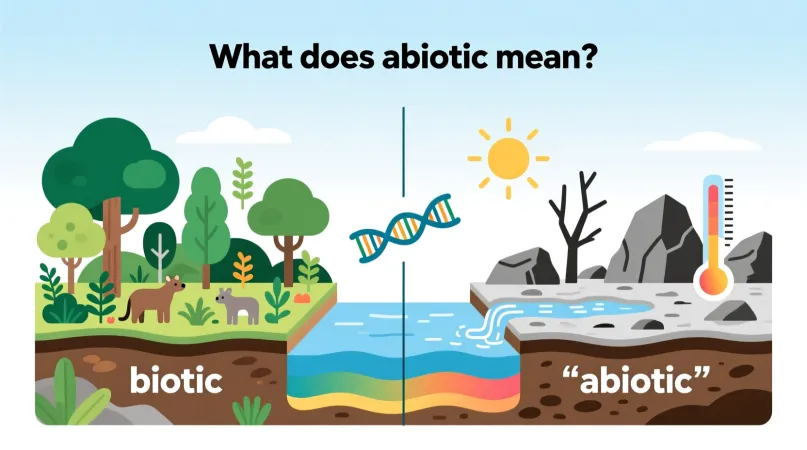Have you ever been scrolling through a science chat or a biology TikTok and stumbled upon the word abiotic, thinking, “Wait… what does that even mean?” Don’t worry, you’re not alone.
This term pops up often, especially in discussions about the environment, ecosystems, or even casual science memes.
Understanding it can make your conversations, posts, and even homework discussions a lot smoother.
Quick Answer: Abiotic means “non-living environmental factors.” It’s a friendly, informative term used to describe things in nature that aren’t alive but still influence living organisms, like sunlight, temperature, or soil.
🧠 What Does Abiotic Mean in Text?
Abiotic comes from the roots “a-” (without) and “biotic” (life). In simple words, it refers to non-living things that affect living things in an environment.
Example:
- “The amount of sunlight is an abiotic factor in this ecosystem 🌞.”
In short: Abiotic = Non-living factors = Things like sunlight, water, and temperature that affect life.
📱 Where Is Abiotic Commonly Used?
Abiotic isn’t really slang, but in texting or educational chats, you might see it pop up casually:
- 🌿 Biology class discussions
- 📚 Study group chats
- 🎥 Science TikTok or Instagram posts
- 🕹️ Educational gaming discussions about ecosystems
Tone: Friendly, informative, or educational. Not typically used in flirty or casual gossip texts.
💬 Examples of Abiotic in Conversation
A few realistic ways you might see abiotic used:
- A: “Why are the plants dying so fast?”
B: “Check the abiotic factors, like sunlight and water 💧☀️” - A: “What affects the fish in the pond?”
B: “Abiotic stuff mostly — temp, pH, stuff like that 🐟” - A: “Do animals depend on non-living things too?”
B: “Yep, all abiotic factors count! 🌱” - A: “This soil seems weird…”
B: “Could be abiotic issues like minerals or moisture 😅” - A: “Is wind considered alive?”
B: “Nope, totally abiotic 🌬️”
🕓 When to Use and When Not to Use Abiotic
✅ When to Use:
- Science class chats or homework help
- Educational social media posts
- Study group discussions
❌ When Not to Use:
- Formal business emails
- Urgent or serious texts unrelated to science
- Casual slangy conversations with friends
Comparison Table:
| Context | Example Phrase | Why It Works |
|---|---|---|
| Friend Chat | “Abiotic factors messing with the garden 😅” | Casual & friendly |
| Study Group | “Remember to consider abiotic stuff in your report” | Informative & educational |
| Class Discussion | “Sunlight and water are key abiotic factors” | Clear & academic |
| “Please include abiotic factors in your project” | Formal & clear |
🔄 Similar Words or Alternatives
| Slang/Word | Meaning | When to Use |
|---|---|---|
| Biotic | Living organisms in an environment | Science class, textbooks |
| Non-living factor | Same as abiotic | Study chats, discussions |
| Environmental factor | Anything affecting ecosystems | Educational social media |
| Physical factor | Non-biological elements like temp, light | Homework, science projects |
❓ FAQs About Abiotic
Q1: Is abiotic a slang word?
No, it’s a scientific term, but people sometimes use it casually in study chats or memes.
Q2: Can abiotic include things like rocks and air?
Yes! Rocks, air, water, sunlight — all abiotic factors.
Q3: Abiotic vs biotic — what’s the difference?
Abiotic = non-living factors. Biotic = living organisms like plants and animals.
Q4: Can I use abiotic in casual texting?
Only if the topic is science-related or educational. Otherwise, it may confuse people.
Q5: Does abiotic have a plural form?
Yes, you can say “abiotic factors” to refer to multiple non-living elements.
✅ Conclusion
Understanding abiotic is simple once you break it down: it’s all about non-living things in the environment that affect life. From sunlight to soil and water, abiotic factors are everywhere, and knowing the term makes you sound smart in class, study chats, and educational posts. Next time you see the word in a TikTok or homework assignment, you’ll know exactly what it means — and maybe even impress a friend or two 🌿✨.

Oscar Wilde (1854–1900) was an Irish poet, playwright, and wit, famous for his sharp humor, sparkling epigrams, and timeless works like The Picture of Dorian Gray and The Importance of Being Earnest. Celebrated for his clever observations on society and human nature, Wilde’s writing continues to inspire laughter, reflection, and admiration. On jokesplanets.com, we celebrate Wilde’s wit and humor, bringing his legendary cleverness to life for a modern audience who loves smart, funny content.


